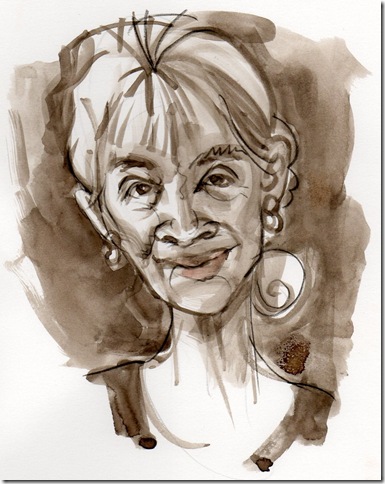Ballet Florida canceled the remainder of its season in March 2009. Wrecked by severe cash flow problems and long-term debt, the company filed for Chapter 7 bankruptcy liquidation in July.
Yet for 23 years, Ballet Florida was the resident contemporary and classical ballet company of West Palm Beach. Its fine balance of the new and the traditional made it a one-of-a-kind.
Now, all that remains are its former studio on Fern Street (just purchased by Palm Beach Atlantic University) and an enormous vacuum in the dance community. Once a company – a family, really — of 23, Ballet Florida has left dancers widely scattered, many still performing, many more teaching, choreographing and freelancing.
You would think that would be the end of Marie Hale, the company’s artistic director and founder. You would be wrong. Talking with Hale in the deep-red Fern Street domain that she can still call her office, you would find her still a bit nostalgic, but looking forward with the determination.
Although in her 70s, Hale has decided to begin again – from scratch. She closed the company and school in July. But she promptly reopened a new school, Dance Florida Academy, on Sept. 18 (enrollment: 180 students). Hale begins as she did more than three decades ago: teaching aspiring young dancers and giving them opportunities to perform in public.
Still with her is the company’s core artistic team, as master teachers: Lynda Swiadon, Hale’s colleague for 44 years; Claudia Cravey; Steven Hoff; and as director/administrator, Joseph J. Bucheck III. Aside from teaching, they’re doubling up on job duties, doing whatever it takes to help the new venture survive.
As Ballet Florida began its long, slow decline, there were some wrenching near-misses and chilling ironies — and some urban legends that Hale wants to dispel.
On a cool, gray, raining and equally depressing December morning, we sit down to chat. The first thing you notice is the unnatural stillness, emptiness and quiet in the Fern Street building. Just six months ago, it was an ever-bustling stage: home to aspiring youngsters, but especially, headquarters of a remarkable company and its inspiring dancers.
McDaniel: So, where is everybody? Where have the dancers gone?
Hale: Everybody else – besides me and Lynda and Joey and Claudia and Steve – they’re all over the place. Tina Martin and Heather Lescaille (wife of retired company dancer-turned-firefighter Alfredo Lescaille), who taught in the (Ballet Florida) school, opened their own school down on South Dixie Highway. (The Florida Dance Conservatory opened in June.)
Jean-Hughes Féray actually had planned for a while that when he retired, he wanted to open a school way north. So he’s up in Abacoa.
Rogelio Corrales’ wife has had a school in Port St. Lucie (St. Lucie Ballet) for a long time. So Rogelio is helping her (along with company dancers Tracy Mozingo and Lorena Jimenez, and choreographer Jerry Opdenaker).
And who knows, maybe next year, in 2010 — or maybe the next year — I’ll get some students from Jean-Hughes and Rogelio and we’ll do a Nutcracker and bring in some professional dancers. But not at the Kravis. It amazes me that I could have the Kennedy Center for what I pay at Kravis.
[Note: Other company dancers, including Yomelia Garcia, now a principal dancer with The Joffrey Ballet, and Deborah Marquez will return to West Palm Beach as guest teachers of Hale’s new academy. Choreographers Ben Stevenson of Texas Ballet Theatre and Mauricio Wainrot of Ballet Contemporaneo del Teatro San Martin of Buenos Aires will be on the guest-teaching schedule as well.]McDaniel: How long did you go through the agony of shutting down?
Hale: Four years! It was four years ago last March that a couple members of the board first suggested that we might have to go under. So if anyone’s blaming it on the economy, that’s not true. We’ve always had problems. But then it just got to be worse and worse. In the last four years, I would wake up in the night worried.
I had the budget I was planning for 2009-10 — which is now. (But trying to keep the company afloat), I straightaway cut $1 million. And just before we closed, I cut even more. I said, “OK, we’ll cut fall performances and come back in November, just in time to present the Nutcracker, and we’ll finish the season early, at the end of March [2010].” So I was planning already to cut back even drastically more. But then, we closed.
McDaniel: After you had already cut back so much, what pushed you over the edge? What was the last straw?
Hale: I guess the last straw was that we couldn’t make payroll. Ed (Sandall, Hale’s husband) had given and given and given, you know, and we just couldn’t make the payroll. And it was March, and we had performed Cinderella, and we couldn’t pay the crew. And we couldn’t pay the Kravis; we owe them money. We still owe the dancers two-and-a-half paychecks for five weeks’ work.
McDaniel: How were the ticket sales?
Hale: Ticket sales were doing pretty good, pretty good.
And Juan (Escalante, company executive director) did work this out: the city was going to buy the [Ballet Florida] building and pay us so much money, and we could stay here for five years, for $1 a year. But before (we declared bankruptcy), the attorney on our board said, “I think we have to sell the building.” So she gave it to a broker. We told the broker that we wanted to sell it, but we would have to have quite a few months’ notice. We need to spend the rest of the season here and we can’t just move 400 students at the drop of a hat.
The broker brought one client here to see the building, and this client said, “I’m interested but they’re gonna have to get out in two weeks.” And so we said no.
And then, when the city was going to buy it, this broker sent us a bill for $180,000 as his commission. So then the city and the commissioners and the mayor said they were not interested in $180,000 of city money going to this man. And so they refused to buy it. So that lawsuit is still going on.
McDaniel: But what created all the previous deficits, the past debts?
Hale: The attitude is out there that we overspent. And we didn’t. We were so frugal. Al Mathers (production manager) would sit up all night to save $5 over at the Kravis Center. Since 1986, productions came in under budget. Every expense for every ballet was accounted for: every plane ticket, every hotel room, every costume.
But the office staff would say, “We can get this fabulous copier that prints in color and does this and that and only costs $1,000-plus!” That was never in the budget. It was the board and the administration that overspent.
And then, too, you remember that last season we did Cleopatra [a full-length Ben Stevenson ballet]. Well, the production itself was built by Houston Ballet, Boston Ballet and Pittsburgh Ballet Theatre – they shared the production costs of $2 million. So (the staff) advertised that we were doing a $2 million production — as if we were paying $2 million dollars. I rented it from Houston for $25,000!
There’s a big difference: $25,000 versus $2 million!
And I heard that someone that said, “My God, no wonder they went bankrupt! What did she spend $2 million on this one ballet for?” And you just want to scream!
McDaniel: What is your biggest wish right now?
Hale: Right now, it’s getting a location that’s big enough to do what we need to do, and cheap enough that we can pay for it. Because we need a lot of room, you know. (As a dance school,) we need high ceilings. It’s hard to find an open space that doesn’t have supporting posts.
McDaniel: Do you have any regrets?
Hale: Regrets? Not really. I don’t know how it would be possible to do a better job choosing the dancers or the ballets. (The dancers and I) got along really well and I was always so good to them. And I don’t know how I could have done anything different that would have made it better.
It just looked like everywhere I turned — at the Eissey Theatre in March, I walked off the stage – into the pit. I literally fell off the stage into the pit! But do you know I was not hurt at all? I was shocked, yes, I was very surprised. But I didn’t even break a fingernail — nothing! And I think that was a premonition of what was coming, because Claudia said, you know, every time Marie tries to get up, something else knocks her down.
McDaniel: Had you considered retiring?
Hale: No, not at all. What would I do? As of August, I’ve been teaching for 56 years. I know so much! I feel obligated to pass it on.
Dance Florida Academy, currently at 500 Fern St. in West Palm Beach, provides classes in ballet, tap, jazz, hip-hop, Zumba, voice and piano to children and adults. Call (561)832-8941 or visit www.dancefloridaacademy.com.

